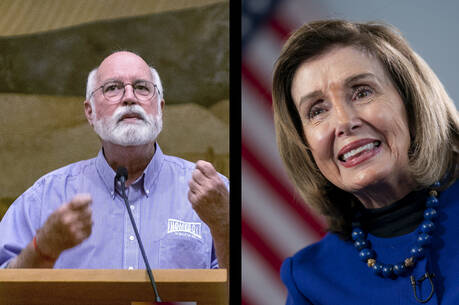As the Biden administration has eased rules that prohibited unaccompanied children from crossing the southern border, U.S. Customs and Border Patrol and other government-run facilities have filled up. Thousands of young people fleeing violence and poverty in their homeland, desperately searching to find someplace safe, turned their eyes to the United States. Such influxes are not new, but they are often seen through a political lens rather than as a humanitarian emergency.
The Catholic Church’s ministry to migrants and refugees stems from our belief that every human person is created in the image and likeness of God. Christ himself was an itinerant preacher without a home of his own, and, as a child, he was also a refugee fleeing persecution and death. We see Christ’s example and we strive to reflect those same values in our pastoral ministry.
As the emergency at the U.S.-Mexico border has intensified, I have reflected and prayed about what can be done to live out the Gospel command to feed the hungry and welcome the stranger and respond accordingly.
As the humanitarian emergency at the U.S.-Mexico border has intensified, I have reflected and prayed about what can be done to live out the Gospel command to feed the hungry and welcome the stranger and respond accordingly. In March, the Diocese of Dallas and its local Catholic Charities immediately responded to the government’s request for help as the government transferred children from cramped border facilities to the city’s convention center. My brother bishops in Dallas arranged for religious services and provided pastoral care, while Catholic Charities Dallas organized a volunteer corps to support the care and stabilization of the children. They saw it as a practical and pastoral exercise of their faith, not a politically motivated one.
We have seen Catholics and many others of good will step up and volunteer to help those who are in need. Catholic Charities agencies and other organizations, from the Rio Grande Valley to San Diego and in cities in the country’s interior, have mobilized volunteers to assist unaccompanied migrant youth by donating time and goods that are helping transition them as they arrive in the United States. Over two hundred Catholic religious sisters have committed to go to the border to support the dioceses and Catholic Charities there and to provide care to migrant children, nearly all of whom have endured some form of trauma across their migration experience.
The Catholic Church also believes in family unity: Where possible and when consistent with child safety, children are best cared for by their families. When family members or suitable sponsors are not available to care for a child, a child should be placed in a loving foster home or a similar setting that can respond to his or her individual needs.
The unprecedented number of children coming through a humane but underdeveloped reception and placement system is not sustainable. The solutions are not simple, but we need to find them.
The Catholic bishops in the United States support the federal government’s decision to address the pent-up demand for safety and asylum at the border and recognize that many factors have contributed to the situation that is driving migration. The unprecedented number of children coming through a humane but underdeveloped reception and placement system is not sustainable. The solutions are not simple, but we need to find them, and this can only be done through collaboration and dialogue. We also call on the governments, religious communities and civil society in the homeland countries to renew their commitment and focus their efforts to maintain the safety of these young and vulnerable children so that they may have the ability to thrive.
We must continue to work with these countries from which these children and their families originate to address the root causes that promote displacement. And the Biden administration should reconsider the continued application of the Centers for Disease Control and Prevention’s order that addresses control of communicable diseases, an order that was put into place to slow the spread of Covid-19 but is unintentionally separating some children from their families.
We must also develop a more humane system of support for asylum seekers in our country through alternatives to detention. Finally, more families are needed to provide short- and long-term foster care for children who are not able to be with their own families.
The Catholic bishops of the United States have long advocated for humane and comprehensive immigration reform, just and proportionate immigration enforcement, and improved access to justice and due process for immigrants and refugees fleeing persecution.
We put action to our words as a longtime government partner through our work with refugees, human trafficking survivors, asylum-seeking families and unaccompanied immigrant children. We will continue to respond to their plight by promoting a Christ-inspired response to welcome and protect those who are in need, and by supporting measures that aim to mitigate the poverty, violence and corruption that push families to migrate in the first place.
More from America:









